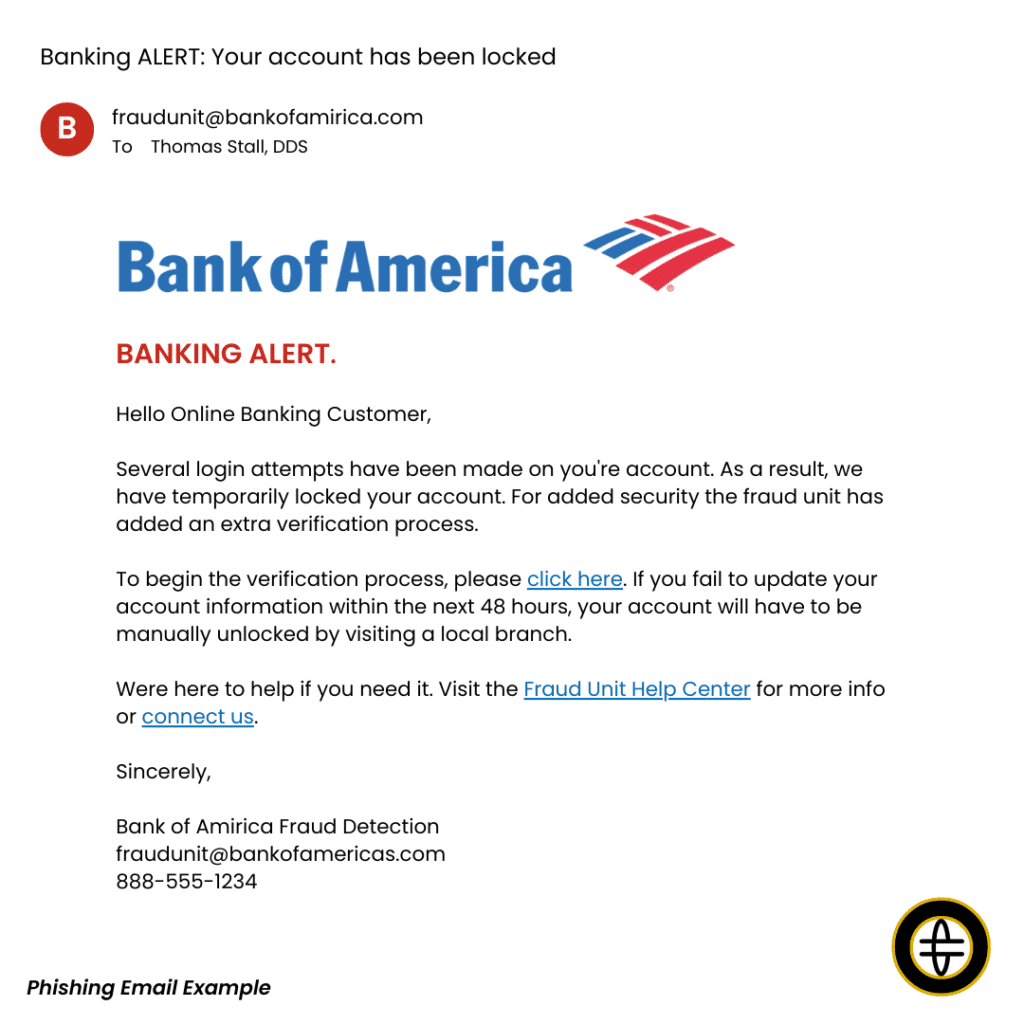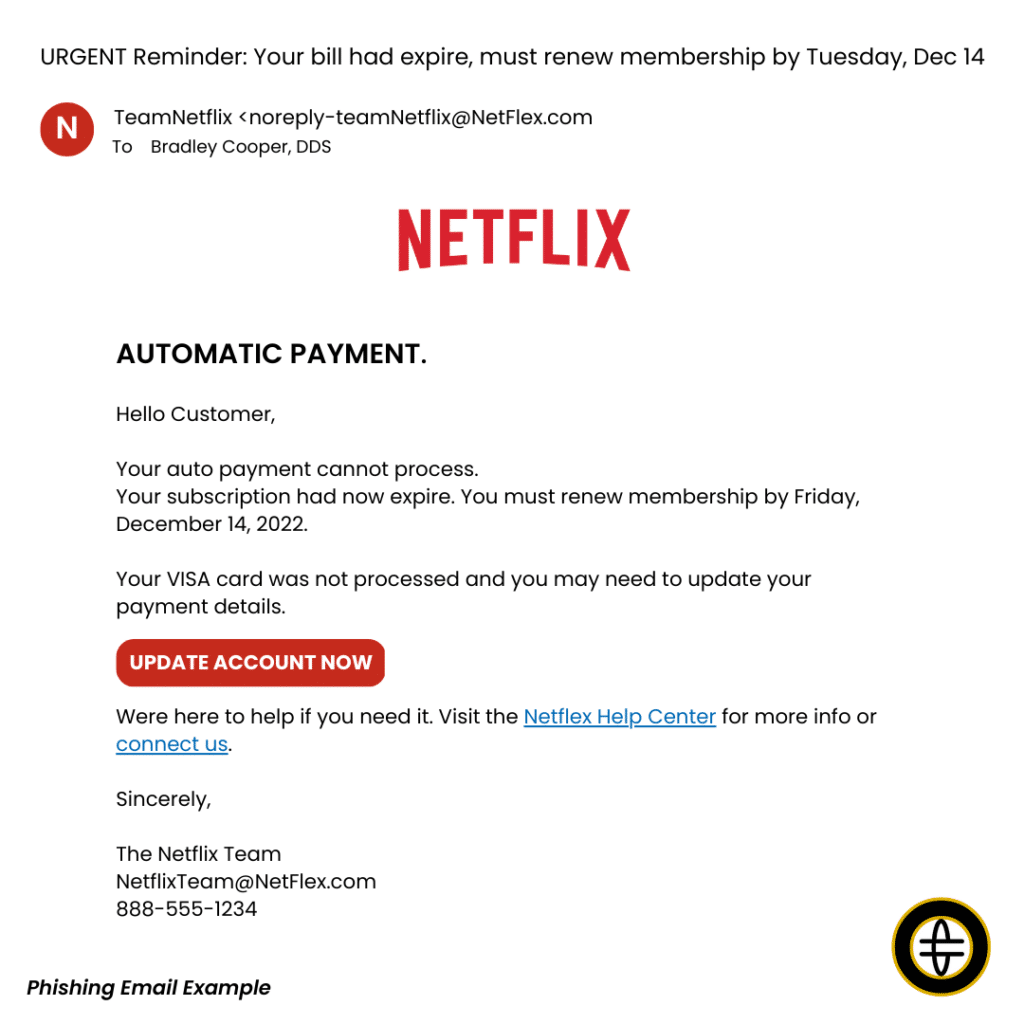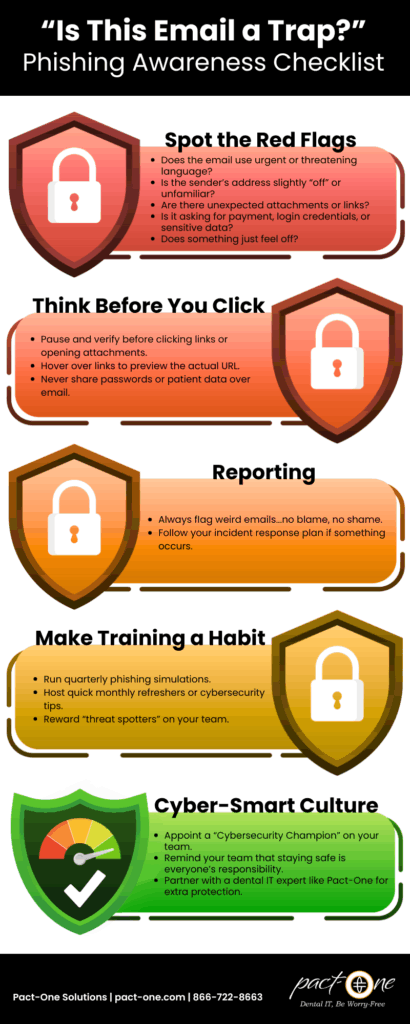Let’s play a quick game of “spot the threat.”
You’re swamped with patients, your front office is managing a flurry of calls, and suddenly...ding...an email arrives: “URGENT: Outstanding Invoice Attached.” It’s from someone who looks vaguely familiar…maybe a vendor? Maybe your CPA?
Spoiler alert: It’s a phish. And if your team clicks it, the consequences could reel in far more than just a slow workday.
So, let’s break down how you can transform your dental team from phish bait to cybersecurity champions.
Why Phishing is Every Dental Practice's Hidden Cavity
Phishing is the most common type of cyberattack, accounting for over 90% of all cyber attacks according to Cybersecurity & Infrastructure Security Agency (CISA). And it’s not just about weird emails from Nigerian princes anymore. Today’s phishing attempts are smart, slick, and often scarily legit-looking.
But here’s the kicker:
Human error is responsible for 60% of all data breaches based on Verizon’s 2025 Data Breach Investigations Report. That’s right...your team is both your biggest asset and your biggest risk.
When it comes to Business Email Compromise (BEC), a type of phishing that impersonates executives or vendors to trick staff into wiring money or handing over sensitive data, the dental industry is a growing target. Why? Because you handle private health info and financial transactions, often without a full-time IT team keeping watch. According to the FBI's IC3 2024 Internet Crime Report, in 2024 alone more than $6.3 billion was transferred as part of BEC scams (approx. $50,000 per victim).
Just look at the following examples and see if you can spot the FAKE:
Use our free Avoiding Phishing Scams Guide for assistance.
Step 1: Show, Don't Just Tell
Cybersecurity training isn’t a one-and-done PowerPoint. You need to simulate the threat.
Start with regular phishing simulations that mimic real-world email scams. These help staff spot red flags in a safe environment and track who needs more help without finger-pointing.
At Pact-One, we recommend quarterly phishing tests. Why? Because people forget. And cybercriminals don’t take holidays. We even run them internally with our own team.
Pro tip: Use real-life examples of phishing emails tailored to dental practices (like fake lab invoices or bogus patient insurance updates) to make training relatable.
Step 2: Create a "Pause Before You Click" Culture
Your team is used to fast-paced days and quick decisions. But cybersecurity requires a slowdown and double-check mentality.
Encourage your staff to ask:
- Does the sender's email look off? (Like “invoices@amaz0n.biz”)
- Is the message urgent or fear-based?
- Are there strange links or attachments?
Empower them to report suspicious emails without shame. A culture of transparency beats one of silence and “I didn’t want to bother anyone.”
Step 3: Train for the Long Haul, Not Just Compliance
Sure, there are HIPAA requirements to consider, but training shouldn’t just be a checkbox.
Make it part of your practice’s DNA:
- Monthly mini-trainings or tips in staff meetings.
- Cybersecurity champions on the team who keep an eye out for sketchy emails.
- Rewards for those who catch phishing attempts. (Who doesn’t love a coffee gift card for saving the day?)
And always, always revisit your policies after any incident, even near misses.
Phishing Awareness Checklist for Dental Teams
Here’s a Phishing Awareness Checklist for your dental team. Feel free to print it, share it, or even tape it near the front desk!
Phishing is Inevitable. Falling for it Isn't.
Cyber threats keep evolving. In fact, data shows that threat actors are using AI generated text in malicious emails which has eliminated key indicators of previous falters (misspelling or bad grammar).
But your team’s defenses can evolve too!
By building a culture of awareness, reinforcing it with regular training, and partnering with cybersecurity experts who get dental practices, you’re not just protecting your inbox...you’re protecting your patients, your data, and your peace of mind.
Need help training your team or setting up email protections that actually work?
Let’s talk about your cybersecurity game plan.
P.S. Forward this to your office manager. They’re the real MVP when it comes to catching sketchy emails. 😎
Dental IT. Remove the Burden. Embrace the Use.
Quality patient care – it's ultimately why you became a dental professional. But, some business operations can get in the way (such as pesky computer issues or lack of IT support). That’s where Pact-One Solutions can help! Our passion lies in supplying reliable, responsive dental IT support and security that practices can count on.
Whether you’re looking for dental IT services for your startup or searching for more responsive dental IT support – our team of dental IT specialists have you covered. With team members throughout the United States, we offer nationwide support to dental practices of all sizes, specialties, and stages of growth. Our wide range of dental IT services ensure your data is secure, accessible, and protected.
Don't let technology challenges hinder your ability to deliver exceptional dental care. Contact us at info@pact-one.com or 866-722-8663 to join over 3,000 dental professionals thriving with the support of a dedicated dental IT team.






You must be logged in to post a comment.